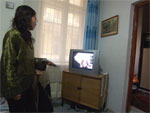Cherries and Silence
Second-generation Chinese immigrants in Hungary and their use of the media
Why do you think I'm here?
a. because you shouldn't miss Hungary
b. because of my studies
c. because I'm a tourist
(entry from the blog of a girl from Hong Kong living in Hungary )
The Chinese community in Hungary is not a very popular subject with sociologists dealing with minorities, and the colony as a media audience is hardly discussed. Yet we at the Biennale working group were interested in just that: how do the migrants inhabit the media space that exists outside the public and private spaces of Budapest , and is composed of the various communication networks. At the start of this investigation, I made recourse to a few empirical observations and assumptions, like the shallowness of the Chinese' integration into Hungarian society and their poor command of the language. Though the latter excludes them from the media culture of the host country, the resulting dominance of the Chinese media in their consumption may reinforce their transnational identity, as television and radio programming is known to produce and maintain national identity (Morley 2000). Furthermore, in the distanceless culture of post-traditional societies, people in principle can have access to any information, wherever they are.
My chief method of data collection was deep interviews, conducted with eight young second-generation Chinese immigrants, and the family of one of them. (1) I met the interviewees, 19 to 30 years in age, through recommendations. Most of them are students, and many among them want to be businesspeople. My choice of subjects was greatly influenced by the fact that only a fraction of the community has a command of Hungarian sufficient for conversation. (2) Another argument for speaking with young people was that they are far better integrated into Hungarian society than their parents. I was interested, among other things, in the extent of this integration, and how this helps them use the local media.
I used content analysis to process the interviews. In the following study, I will outline a few typical attitudes, which throw some light on how the young generation of the Hungarian Chinese community builds its own media space.
Characteristically, the state-run Chinese media of the homeland are available in Hungary , while there is no local television or radio programming, which would presuppose cooperation, the representation of common interests and continuity. Three channels of the Chinese public television (CCTV1, CCTV4 and CCTV9) can be received in Hungary , via cable or satellite, and there is also a Hong-Kong-based channel, Phoenix TV. The CCTVs serve and convey the ideology of the state party: political news items, for instance, follow one another in accordance with the political pecking order. Phoenix TV offers a more nuanced view of the world than the public channels. The number of available Chinese newspapers is constantly changing, with generally five or six on the market, one of which is a daily and two of which are free. They have similar structures, featuring a lot of advertising, political and cultural news lifted from the Internet, and propaganda. There are no exact data on the number of copies sold, except for the weekly Shichang (Market), which sells, on average, 800 copies. There is no Chinese radio channel, and there is only a single programme for the community, Radio Tilos's Csodálatos Mandarin (The Miraculous Mandarin), on Wednesdays. Practically the only civic attempts to develop content can be found on the Internet. The Chinese living in Hungary maintain several BBS's (forums), which provide information about living in this country - which I will return to later.
What emerges from the accounts of experts whose work involves dealing with the Chinese on a regular basis, and of people who frequently communicate with them, is that the Chinese taking up permanent or temporary abode in Hungary are very passive in their use of the available media, and have done little to create their own community media. The main reason is to be sought in a culture of temporariness. It was also my impression during the interviews that the immigrants often do no have a formulated vision of, or definite ideas about the future. The children often told me they did not know why their parents stayed permanently at what was to be a temporary station on the way to Germany , France or Italy . They must be satisfied with the living they can make here, but they never ruled out the possibility of moving on, or back to their roots, their homeland. They have settled for a prolonged temporariness, which is why they do not seek the opportunities to assimilate in the civic and cultural life of Hungary . So important for commerce, they started building their network of relationships back in China , and extend them within the colony, and are consequently less dependent on Hungarian society's channels of mobility - as already pointed out by several researchers (e.g., Nyíri 1999). Another reason why the Chinese in Hungary do not cooperate with each other is that they cannot be considered a homogeneous group. The immigrant community is composed of different clans, which often represent business competition for one another. Finally, their lifestyle may well be responsible for their not very intensive use of the media: they have little time for leisure, as they focus on making a living and repaying loans to friends and relatives back home, which enabled them to leave and start a new life in the first place.
My respondents, however, reported a media use that was more intensive than was to be expected in the light of the above. The reasons are obvious: young people in general are more intensive media consumers; for them the media space is not restricted to Chinese-language content; and they are more intent on integration.
Each of my subjects' family owns a television set, but only one, often not out of necessity; it is probably due to the limited offer of programmes, and the low desire to watch television. Those young persons who cannot receive CCTV channels in their homes said the family would be grateful for the opportunity. Those who can receive both CCTV and Phoenix TV said they prefer the latter, as "it is less of a mouthpiece for Communist ideology".
Several of the respondents' families closely follow day-to-day politics, and claim that their work requires that they do so . For instance, Zhao's father, (3) a merchant , likes to be informed of Hungarian affairs, because "larger politics must be understood". This is his way of learning when prices will rise, and knowing about other things that concern his work indirectly.
Two interviewees said they are watching TV to improve their Hungarian. One of them, Wang, who has been living here for five years, said she felt her Hungarian was up to scratch when she could at last "laugh at Friends ". For the first two years, she adds, she watched Hungarian channels because she wanted to be "a Westerner, a European".
I asked them about their favourite Hungarian programmes. Almost all of them mentioned the evening news, the Fábry Show , Megasztár , the Mónika Show and the Balázs Show . When I asked Zhao whether the latter two would be imaginable in China , he said, possibly, only the subjects would be more interesting, like how a community tries to help a small child who has become ill. He said the Hungarian programmes are less interesting, and he mentioned Győzike's show (a reality show), because he is not interested in "what other people do and how they spend their money". Zhao's mother, who speaks very little Hungarian, likes to watch family soaps on the Hungarian commercial channels, because she thinks the Chinese may say whatever is on their minds, but Europeans have a more animated body language, which she too can understand.
It was interesting to hear how the content of Hungarian programming is decoded through Chinese eyes. Several of the interviewees said it was somewhat different than in their homeland, but they "have grown used to it", and have their own way of relating to Western values. Wang thinks otherwise: "the background is different, the culture is different"; she often sees series whose "subject I can't feel", and whose "stories change far too quickly". When I asked her to cite a programme whose subject she can "feel", she mentioned a Chinese series about the life of a Chinese emperor. Wu thinks the differences are far more comprehensive. He, too, finds Hungarian programmes more boring. "The Chinese", he says, "have a far more dynamic temperament, and often long for far more exciting things than the Hungarians. China is a larger country, and thanks to its longer history, has already gone through a lot. Anything that has happened in Hungary has probably already happened in China ". ( Fostered by the state, this kind of patronising nationalism is quite frequent among the Chinese .)
My interviewees do not listen to much radio, though a few use it to generate background "noise". They rarely read Chinese newspapers in Hungary , and when they do, they do not buy them, but leaf through what they find at home with the family. Many criticise these for their low quality in any case, or as Wu put it, "they are of simple content, often repeating themselves, or simply taking the material from the net". These periodicals come in handy only when he wants to find a job. (We must not forget that these Chinese people speak Hungarian and do not risk exclusion from the media space when they do without the Chinese media.)
The respondents spend a more than the average amount of time on the Internet. Wu and his friend Liu, for instance, are online 4-5 hours a day, chatting, downloading and listening to music, visiting forums. Of the Hungarian sites, they tend to visit news portals, like the average Hungarian web user. Interestingly, two of the interviewees have not even heard of the two most popular news portals, though both have more Hungarian friends than Chinese, and their other habits and knowledge have allowed them to completely assimilate into the subculture of young Hungarians. (4) It seems then, that there is not a complete overlap between their identity and the media they use.
Two of my interviewees are registered at iWiW, the largest Hungarian online social network, and they have far more Hungarian acquaintances in this community than Chinese . ( Incidentally, the Chinese are significantly underrepresented on iWiW, which has currently 700,000 members, of whom only 70 are Chinese.)
Of the Hungarian Chinese websites, bbs.huncn.com, or bbs (5) for short, is the best known, with almost everyone using it, at least occasionally. It is the largest Chinese-Hungarian forum, with 2000 registered users. Earlier there were other BBS initiatives, but they withered one after the other, due to a lack of interest. Thanks to a new generation of intensive Internet users, the children of the young immigrants who arrived in the early 1990s, the number of BBS's has grown in recent years. Though these forums make no profit, and host no advertising, there are Chinese companies who invest in the formation of an online community. The BBS "huncn", for instance, is supported by the Chinese owner of a Hungary-based accounting firm, as I learned from one of the moderators of the forum.
The BBS has a lot of occasional users. Fifty to sixty people represent the "hard core", some of whom met through the forum, and are now friends in real life. This BBS is also important for those Chinese in the homeland who consider trying their luck in Hungary . Its look is completely different from that of other Hungarian or European forums, which have a well -arranged structure, and concentrate on the text; the Chinese BBS is jam-packed with animated graphics and colourful icons. Everyone has their own avatar, or personalised icon, and illustrated signature, which often takes up more of the entries than the actual comment.
Most of the respondents do not read blogs. Only Wang from Hong Kong writes a blog, which she calls Hunghonghom. (6) People tend to read their friends' blogs, though Jiang also mentioned the Prime Minister's blog as something he reads.
The most popular forms of communication with those who remained back in the home country include telephone, Skype , MSN Messenger, qq (7) and email. Many people use calling cards, which allow cheaper phone calls. (Several telephone companies have recognised the important market share of calls to China, which now cost as much as calls to Europe.) Though it has often been reported that China Telecom , the country's sole telephone provider, restricts the use of Skype, to increase its own profit, compelling the Chinese to use messaging services for long-distance communication, several of my interviewees denied this, saying it was not their experience, nor have they heard about others experiencing it. Others were aware of the reports and confirmed them.
Beside their use of the media, I also inquired about my respondents' leisure activities. The Chinese are proverbial fans of karaoke. It is a staple service of the event rooms of Chinese restaurants in Hungary, but home get-togethers also feature karaoke sessions accompanied by DVD. My interviewees are less conscientious followers of the tradition, the majority of whom never karaoke at all. Liu says she is not the type "to sing beautifully". Though Wang used to karaoke in China , she has given it up, because, "if you live away from China, you don't know the most recent hits, and you can't sing along".
Casinos are another popular form of entertainment. ("Every Chinese tourist in Hungary", claimed Wang, "wants to visit two places: a casino and a Chinese restaurant".) Casinos, of course, have a small clientele of a certain class, and as was to be expected, none of the respondents visit them. Zhao's parents were also adamantly against it, and Zhao's mother pointed out that "a good husband does not go to the casino".
A few years ago, Budapest hosted three hugely successful Chinese video rental shops, where one could always find the latest Taiwan love stories, "mystic kung-fu" movies from Hong Kong and Chinese historical dramas. These days, young people tend to buy films (cheaply, on DVD) when they go to China , and then back in Hungary lend them to one another. They also download films from the Internet, like any other users of the web.
At the end of the semi-structured conversations, I asked them what they miss most about China , and what it is they like in Hungary . Wang, a true cosmopolitan traveller who feels equally at home in China, Hong Kong , Hungary and the Netherlands, believes that, "if you get used to life in Hungary, there is no way back. In China the buildings are tall, everything is crowded and noisy, and the flats are too small. There are no pleasant cafés like here. Chinese cities, on the other hand, are full of shops that are open till midnight, and there are more places to go out". Chen's father is of similar opinion, and he misses the bustle of Chinese street life. Zhao's family miss seafood, but are happy about the clean air, the silence and the fact that cherry trees not only bloom, but also bear delicious fruit.
By way of conclusion, we can say that if the younger generation is no more certain than their parents about wanting to stay in Hungary in the long run, they are certainly more receptive towards the Hungarian lifestyle, and the idea of living in symbiosis with other nationalities. Their life is less isolated than their parents', and they seek to integrate into their age group. (Their choice of occupation, on the other hand, indicates that they still prefer to leave themselves to the protection of the Chinese social network.) One of the symptoms and agents of their desire to integrate is that they feel at home in the Hungarian-language media space, though their experience is still fragmented, hybridised, and allows limited access to culture.
****
I wish to thank the interviewees for their generous help and cooperation.
Sources
Morley, D. (2000), Home territories : media, mobility and identity. London: Goldsmiths College.
Nyíri, P. (1999), Új ázsiai migráció Kelet-Európába: a magyarországi kínaiak [New Asian Migration in Eastern Europe: The Chinese in Hungary]. Regio, 10, pp. 3-4, 93-104.
1. The research project of the Biennale team was not restricted to the Chinese colony in Hungary ; we also considered the presence of the Vietnamese, Mongols and other South-Asian ethnicities. Because of the language barriers, however, this study deals with only the Chinese media and the Chinese colony.
2. Although the survey was not representative, I do think that what the second-generation Chinese think about Hungarian culture and the content of the media reveals a lot about the intentions of young people as regards mobility and integration.
3. The interviewees' names have been changed to protect their privacy.
4. I tried to gauge the degree my interviewees' integration into Hungarian culture, among other things, by asking them to tell me how many Hungarian and how many local Chinese entries they have in the phonebook of their mobile phones. With the exception of Zhao ' s mother and father, all reported a majority of Hungarian acquaintances.
5. Note that BBS, or the Bulletin Board System, denotes a now archaic method of network communication. The BBS is a database hosted on a single distinct computer, which members have to dial-in to read the posted documents or add their own. It was a widespread form of community communication before the Internet became prevalent. Now the Chinese call online forums BBS's.
6.Cihan.Hunghonghome. http://hunghong.blogspot.com
7. The most popular instant messaging service in China .
|
Interview excerpts

Watching TV at Zhao's home

Jiang shows her favourite channels

BBS homepage

BBS forum page

Zhao's desktop

Hu's desktop
Home Abroad - annotations to a qualitative media research |